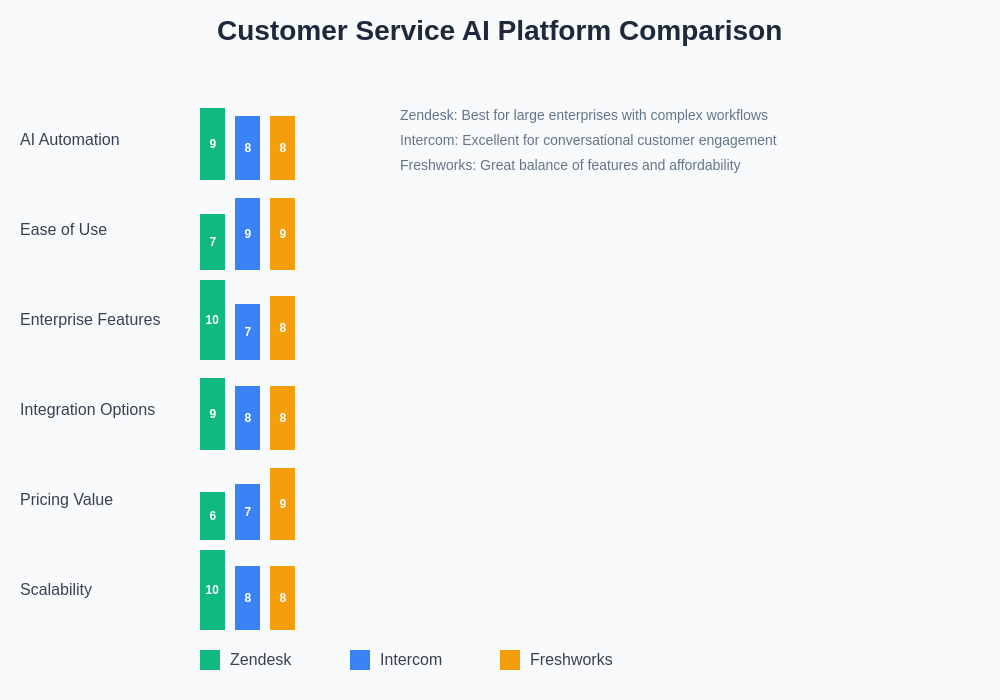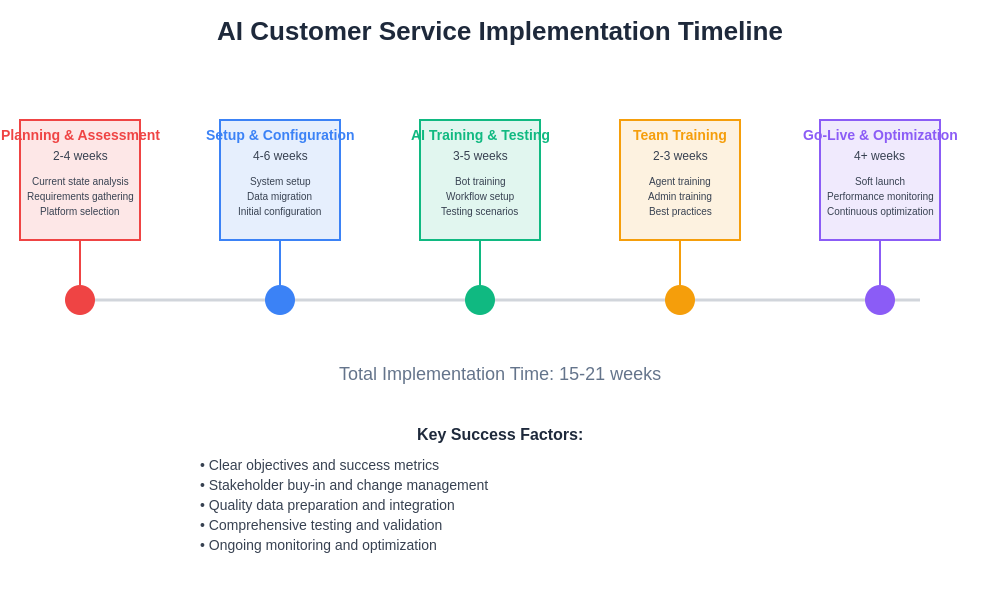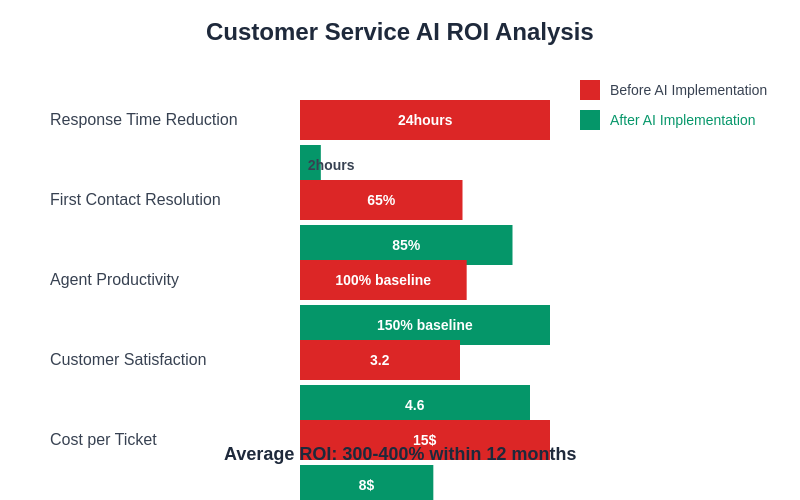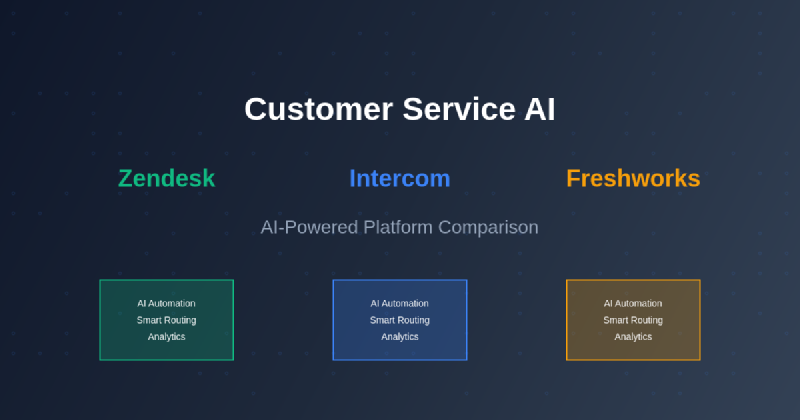The evolution of customer service has reached a transformative milestone with the integration of artificial intelligence into support platforms, fundamentally reshaping how businesses interact with their customers and manage support operations. Leading this revolution are three powerhouse platforms that have redefined the landscape of customer service technology: Zendesk, Intercom, and Freshworks. These sophisticated solutions leverage advanced AI capabilities to automate responses, predict customer needs, and deliver personalized experiences that were previously impossible to achieve at scale.
Explore the latest AI-powered customer service trends to discover cutting-edge innovations that are transforming how businesses deliver exceptional customer experiences. The convergence of artificial intelligence and customer service represents more than just technological advancement; it embodies a strategic shift toward proactive, intelligent, and deeply personalized customer engagement that drives both satisfaction and business growth.
The AI Revolution in Customer Service
The implementation of artificial intelligence in customer service platforms has fundamentally altered the dynamics of customer support, enabling businesses to provide instantaneous, accurate, and contextually relevant assistance regardless of time zones or support team availability. Modern AI-powered customer service solutions have evolved far beyond simple chatbots, incorporating sophisticated natural language processing, machine learning algorithms, and predictive analytics that can understand customer intent, analyze historical interactions, and deliver solutions that feel genuinely human in their responsiveness and empathy.
This technological evolution has created unprecedented opportunities for businesses to scale their support operations while simultaneously improving the quality of customer interactions. The integration of AI enables support teams to focus on complex, high-value interactions while automated systems handle routine inquiries, create support tickets, route conversations to appropriate specialists, and even resolve common issues without human intervention. The result is a more efficient support ecosystem that delivers faster resolution times, higher customer satisfaction scores, and improved operational efficiency.
Zendesk: The Enterprise AI Powerhouse
Zendesk has established itself as the premier enterprise-grade customer service platform, leveraging sophisticated AI capabilities to transform how large organizations manage customer relationships and support operations. The platform’s AI infrastructure, powered by Zendesk’s Answer Bot and advanced machine learning algorithms, provides intelligent automation that can handle complex customer inquiries, analyze conversation patterns, and continuously improve response accuracy through machine learning feedback loops.
The platform’s strength lies in its comprehensive approach to AI integration, offering features such as intelligent ticket routing that automatically assigns inquiries to the most qualified agents based on expertise, availability, and historical performance metrics. Zendesk’s sentiment analysis capabilities enable real-time monitoring of customer emotions throughout interactions, allowing support teams to identify potential escalations before they occur and adjust their approach accordingly. The platform’s predictive analytics provide valuable insights into customer behavior patterns, enabling proactive support strategies that address issues before customers even realize they need assistance.
Zendesk’s AI-powered knowledge base continuously learns from successful resolutions, automatically updating suggested articles and creating new content based on recurring customer questions and successful agent responses. This self-improving system ensures that both customers and support agents have access to the most current and effective solutions, reducing resolution times and improving first-contact resolution rates. The platform’s integration capabilities allow seamless connection with existing business systems, creating a unified customer data ecosystem that provides complete visibility into customer journeys and interaction histories.
Enhance your customer service strategy with Claude AI to leverage advanced reasoning capabilities for complex customer inquiries and sophisticated support automation. The combination of human expertise and AI-powered insights creates a support environment where every customer interaction becomes an opportunity to deliver exceptional service while gathering valuable insights for continuous improvement.
Intercom: Conversational AI Excellence
Intercom has revolutionized customer communication through its conversational AI platform that seamlessly blends automated assistance with human expertise, creating natural, engaging interactions that feel genuinely personal rather than mechanically scripted. The platform’s Resolution Bot utilizes advanced natural language processing to understand customer intent, context, and emotional undertones, enabling it to provide relevant assistance while maintaining a conversational tone that reflects the brand’s personality and values.
The platform’s strength lies in its sophisticated conversation routing system that intelligently determines when to engage AI assistance, when to transfer to human agents, and how to maintain context throughout complex multi-channel interactions. Intercom’s AI learns from every customer interaction, continuously refining its understanding of customer needs and improving its ability to provide accurate, helpful responses. The platform’s proactive messaging capabilities enable businesses to reach out to customers with relevant information, support offers, or product recommendations based on behavioral triggers and engagement patterns.
Intercom’s visual conversation builder empowers businesses to create sophisticated automated workflows without requiring technical expertise, enabling marketing and support teams to design complex conversation paths that adapt based on customer responses and behavioral data. The platform’s real-time collaboration features allow human agents to seamlessly take over conversations from AI systems while maintaining full context of previous interactions, ensuring smooth transitions that don’t disrupt the customer experience.
The platform’s analytics and reporting capabilities provide detailed insights into conversation performance, customer satisfaction metrics, and AI effectiveness, enabling businesses to continuously optimize their automated support strategies. Intercom’s integration ecosystem connects with hundreds of business applications, creating a comprehensive customer data platform that enables personalized experiences across every touchpoint of the customer journey.

The landscape of customer service AI platforms reveals distinct strengths and specializations that cater to different business needs, organizational sizes, and technical requirements. Understanding these differences is crucial for selecting the platform that best aligns with specific customer service objectives and operational constraints.
Freshworks: The Comprehensive AI Suite
Freshworks has distinguished itself through its comprehensive approach to customer service AI, offering an integrated suite of tools that address every aspect of customer relationship management while maintaining simplicity and ease of use that makes advanced AI capabilities accessible to businesses of all sizes. The Freshworks AI platform, powered by Freddy AI, combines intelligent automation with predictive analytics to create a customer service ecosystem that anticipates needs, automates routine tasks, and provides actionable insights for strategic decision-making.
The platform’s intelligent ticket management system automatically categorizes, prioritizes, and routes customer inquiries based on content analysis, urgency indicators, and customer value metrics. Freshworks’ AI continuously learns from resolution patterns and agent feedback, improving its ability to predict appropriate solutions and suggest relevant knowledge base articles. The platform’s conversation intelligence analyzes customer interactions across multiple channels to identify trends, sentiment patterns, and opportunities for service improvement.
Freshworks excels in its unified approach to customer data management, providing a single view of customer interactions across email, chat, phone, social media, and self-service portals. This comprehensive perspective enables AI systems to provide contextually relevant responses based on complete customer histories rather than isolated interactions. The platform’s automation workflows can be customized to handle complex business processes, from initial contact through resolution and follow-up, ensuring consistent service delivery regardless of interaction volume or complexity.
The platform’s reporting and analytics capabilities provide deep insights into support performance, customer satisfaction trends, and operational efficiency metrics. Freshworks’ AI-powered forecasting helps businesses predict support volume, identify potential bottlenecks, and optimize resource allocation to maintain service quality during peak periods. The platform’s marketplace of integrations and extensions enables businesses to customize their customer service ecosystem to meet specific industry requirements and operational needs.
Leverage Perplexity AI for comprehensive customer service research to gather insights and develop strategies that enhance your customer support operations with data-driven decision making. The integration of multiple AI tools creates a powerful ecosystem for understanding customer needs and optimizing service delivery across all channels.
Feature Comparison and Capabilities
The evaluation of customer service AI platforms requires careful consideration of feature sets, integration capabilities, scalability options, and alignment with specific business objectives. Each platform offers unique strengths that cater to different organizational needs, from enterprise-scale operations requiring sophisticated customization to growing businesses seeking user-friendly solutions that can scale with their success.
Zendesk’s enterprise focus is evident in its robust customization options, extensive API capabilities, and sophisticated workflow automation tools that can handle complex organizational structures and varied customer service processes. The platform’s AI capabilities excel in large-volume environments where intelligent routing, predictive analytics, and automated resolution can significantly impact operational efficiency and customer satisfaction scores.
Intercom’s conversational approach prioritizes engagement quality and customer experience, making it particularly effective for businesses that rely on relationship building and personalized communication. The platform’s AI excels in understanding conversational context, maintaining engagement throughout complex interactions, and providing smooth transitions between automated and human assistance.
Freshworks strikes a balance between comprehensive functionality and user accessibility, offering enterprise-grade features with intuitive interfaces that don’t require extensive technical training. The platform’s AI capabilities are designed to provide immediate value while growing with business needs, making it an excellent choice for organizations seeking powerful automation without overwhelming complexity.
Implementation Strategies and Best Practices
Successful implementation of customer service AI platforms requires strategic planning that considers current support processes, customer expectations, team capabilities, and long-term business objectives. The most effective deployments begin with thorough analysis of existing customer service metrics, common inquiry types, and areas where automation can provide immediate value without compromising service quality.
Training and change management represent critical components of successful AI platform implementation. Support teams need comprehensive education on how AI tools enhance their capabilities rather than replace their expertise. Effective implementations focus on demonstrating how AI handles routine inquiries, provides intelligent suggestions, and enables agents to focus on complex problem-solving and relationship building activities that require human insight and empathy.
Data quality and integration planning are fundamental to AI platform success. Customer service AI systems require clean, comprehensive data to provide accurate responses and insights. Organizations must invest in data consolidation, cleansing, and integration processes that ensure AI systems have access to complete customer histories, product information, and organizational knowledge bases.
Continuous optimization and performance monitoring ensure that AI systems improve over time and continue meeting evolving customer expectations. Regular analysis of AI performance metrics, customer feedback, and resolution rates provides insights for refining automation rules, improving knowledge bases, and enhancing overall service delivery effectiveness.

The journey from traditional customer service to AI-enhanced operations follows a structured progression that balances immediate improvements with long-term strategic transformation. Understanding this timeline helps organizations set realistic expectations and plan resources appropriately for successful AI adoption.
Integration Ecosystem and Scalability
Modern customer service AI platforms must seamlessly integrate with existing business systems, from CRM platforms and e-commerce solutions to marketing automation tools and business intelligence systems. The depth and breadth of integration capabilities often determine the overall effectiveness and return on investment of customer service AI implementations.
Zendesk’s extensive marketplace and API ecosystem enable integration with hundreds of business applications, creating comprehensive customer data platforms that provide AI systems with rich context for decision-making and response generation. The platform’s webhook capabilities and custom application framework allow organizations to create tailored solutions that address specific industry requirements and operational needs.
Intercom’s integration approach focuses on creating seamless workflows between customer communication and business operations. The platform’s native integrations with popular business tools enable automated data synchronization, trigger-based messaging, and comprehensive customer journey tracking that enhances AI effectiveness and provides valuable insights for strategic decision-making.
Freshworks offers a balanced integration ecosystem that combines ease of setup with comprehensive functionality. The platform’s pre-built integrations handle common business scenarios while custom integration options provide flexibility for unique organizational requirements. The unified Freshworks suite creates natural synergies between customer service, sales, and marketing operations that enhance overall business efficiency.
Cost Considerations and ROI Analysis
Investment in customer service AI platforms requires careful evaluation of both direct costs and potential return on investment through improved efficiency, enhanced customer satisfaction, and reduced operational expenses. The total cost of ownership extends beyond platform licensing to include implementation, training, ongoing optimization, and integration expenses.

The quantifiable benefits of implementing AI-powered customer service solutions demonstrate substantial improvements across critical performance metrics. Organizations typically see significant returns on investment through reduced response times, improved resolution rates, enhanced agent productivity, and increased customer satisfaction scores.
Zendesk’s enterprise pricing reflects its comprehensive feature set and extensive customization capabilities. Organizations typically see ROI through reduced agent workload, improved first-contact resolution rates, and enhanced customer satisfaction scores that translate to increased customer retention and lifetime value. The platform’s analytics capabilities provide detailed metrics for measuring and optimizing ROI over time.
Intercom’s conversational focus often generates ROI through improved conversion rates, enhanced customer engagement, and reduced churn rates. The platform’s ability to identify and nurture high-value prospects through intelligent conversation routing and personalized messaging can significantly impact revenue generation beyond traditional customer service metrics.
Freshworks’ comprehensive approach provides ROI through operational efficiency gains across multiple business functions. The integrated suite eliminates redundant systems, reduces training requirements, and creates synergies between customer service, sales, and marketing activities that enhance overall business performance.
Security and Compliance Considerations
Customer service AI platforms handle sensitive customer data and must comply with various regulatory requirements, from GDPR and CCPA to industry-specific compliance standards in healthcare, finance, and other regulated sectors. Security and compliance capabilities are critical factors in platform selection and implementation planning.
All three platforms provide enterprise-grade security features including data encryption, access controls, audit trails, and compliance reporting capabilities. However, the specific implementation and certification levels vary, requiring careful evaluation against organizational requirements and regulatory obligations.
Data residency and processing location considerations are particularly important for organizations operating across multiple jurisdictions with varying data protection requirements. Platform capabilities for managing data location, processing restrictions, and cross-border data transfers must align with organizational compliance needs.
Future Trends and Innovation Directions
The evolution of customer service AI continues at a rapid pace, with emerging technologies like generative AI, advanced natural language processing, and predictive analytics creating new possibilities for customer engagement and service delivery. Understanding these trends helps organizations make strategic platform decisions that position them for future success.
Generative AI capabilities are beginning to transform customer service by enabling more sophisticated content creation, personalized response generation, and intelligent knowledge base management. Platforms are integrating these capabilities to provide more natural, contextually relevant interactions that feel genuinely personalized rather than template-based.
Predictive analytics and machine learning advances are enabling more sophisticated customer behavior prediction, proactive service delivery, and intelligent resource allocation. These capabilities help organizations anticipate customer needs, prevent issues before they occur, and optimize support operations for maximum efficiency and effectiveness.
The integration of voice AI, visual recognition, and multi-modal interaction capabilities is expanding the possibilities for customer service delivery across diverse channels and interaction types. These advances enable more natural, intuitive customer experiences while providing support teams with richer context and more effective tools for problem resolution.
The continued advancement of customer service AI platforms promises to unlock new levels of efficiency, personalization, and customer satisfaction while maintaining the human elements of empathy, creativity, and complex problem-solving that remain essential for exceptional customer service. The future lies in intelligent augmentation of human capabilities rather than replacement, creating service experiences that combine the best of artificial intelligence with human expertise and care.
Disclaimer
This article is for informational purposes only and does not constitute professional advice. The views expressed are based on current understanding of customer service AI technologies and platform capabilities. Readers should conduct their own research and consider their specific requirements when selecting customer service platforms. Platform features, pricing, and capabilities may change over time, and effectiveness may vary depending on specific use cases, implementation approaches, and organizational factors.
